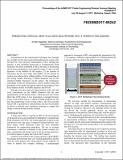Predicting Critical Heat Flux With Multiphase CFD: 4 Years in the Making
Author(s)
Baglietto, Emilio; Demarly, Etienne; Kommajosyula, Ravikishore
DownloadV01CT16A009-FEDSM2017-69242.pdf (1.915Mb)
PUBLISHER_POLICY
Publisher Policy
Article is made available in accordance with the publisher's policy and may be subject to US copyright law. Please refer to the publisher's site for terms of use.
Terms of use
Metadata
Show full item recordAbstract
Advancement in the experimental techniques have brought new insights into the microscale boiling phenomena, and provide the base for a new physical interpretation of flow boiling heat transfer. A new modeling framework in Computational Fluid Dynamics has been assembled at MIT, and aims at introducing all necessary mechanisms, and explicitly tracks: (1) the size and dynamics of the bubbles on the surface; (2) the amount of microlayer and dry area under each bubble; (3) the amount of surface area influenced by sliding bubbles; (4) the quenching of the boiling surface following a bubble departure and (5) the statistical bubble interaction on the surface. The preliminary assessment of the new framework is used to further extend the portability of the model through an improved formulation of the force balance models for bubble departure and lift-off. Starting from this improved representation at the wall, the work concentrates on the bubble dynamics and dry spot quantification on the heated surface, which governs the Critical Heat Flux (CHF) limit. A new proposition is brought forward, where Critical Heat Flux is a natural limiting condition for the heat flux partitioning on the boiling surface. The first principle based CHF is qualitatively demonstrated, and has the potential to deliver a radically new simulation technique to support the design of advanced heat transfer systems.
Date issued
2017-07Department
Massachusetts Institute of Technology. Department of Mechanical Engineering; Massachusetts Institute of Technology. Department of Nuclear Science and EngineeringJournal
Volume 1C, Symposia: Gas-Liquid Two-Phase Flows; Gas and Liquid-Solid Two-Phase Flows; Numerical Methods for Multiphase Flow; Turbulent Flows: Issues and Perspectives; Flow Applications in Aerospace; Fluid Power; Bio-Inspired Fluid Mechanics; Flow Manipulation and Active Control; Fundamental Issues and Perspectives in Fluid Mechanics; Transport Phenomena in Energy Conversion From Clean and Sustainable Resources; Transport Phenomena in Materials Processing and Manufacturing Processes
Publisher
ASME International
Citation
Baglietto, Emilio, Etienne Demarly, and Ravikishore Kommajosyula. “Predicting Critical Heat Flux With Multiphase CFD: 4 Years in the Making.” Volume 1C, Symposia: Gas-Liquid Two-Phase Flows; Gas and Liquid-Solid Two-Phase Flows; Numerical Methods for Multiphase Flow; Turbulent Flows: Issues and Perspectives; Flow Applications in Aerospace; Fluid Power; Bio-Inspired Fluid Mechanics; Flow Manipulation and Active Control; Fundamental Issues and Perspectives in Fluid Mechanics; Transport Phenomena in Energy Conversion From Clean and Sustainable Resources; Transport Phenomena in Materials Processing and Manufacturing Processes (July 30, 2017).
Version: Final published version
ISBN
978-0-7918-5806-6